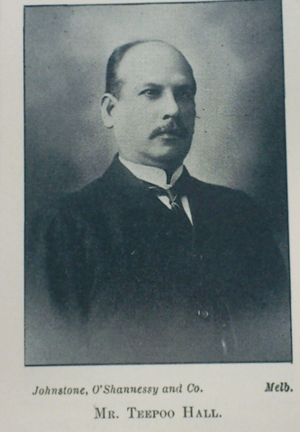Teepoo Hall facts for kids
Frederick Teepoo Hall (1858 – 14 May 1909) was an important Australian doctor. He is known for helping to start the field of physiotherapy in Australia. From 1900 to 1907, he was the Senior Masseur at the Melbourne Hospital. He also helped create the Australian Physiotherapy Association in 1905. Throughout his life, Hall strongly supported the British Indian community in Australia. He fought against unfair rules that stopped people from certain backgrounds from moving to Australia. Hall became sick in 1908 and stopped working. He passed away in 1909 from his illness.
Contents
Early Life and Education
Frederick Teepoo Hall was born in Mysore, India, in 1858. His mother was Indian, and his father was English. He studied medicine at Bangalore College. In 1876, he joined the Subordinate Medical Service. He also served in the Third Anglo-Burmese War.
Hall's Career in Australia
Starting Work in Melbourne
Around 1888, Hall moved to Melbourne, which was then part of the Colony of Victoria. He started his own massage practice on Collins Street. A well-known doctor, Sir Thomas Naghten Fitzgerald, helped him get started.
Hall was smart and well-educated. He quickly became a respected doctor. Many important people in Melbourne's high society became his patients. These included John Hope, 7th Earl of Hopetoun and Supreme Court Judge Hartley Williams. Even some journalists from The Age newspaper sought his help.
From 1890, Hall shared positive reviews from his patients in local newspapers. This helped him get even more clients. Even though many Asian immigrants faced challenges in Australia at that time, Hall became a highly respected teacher for white doctors.
He trained his assistants through a two-year program. This helped set high standards for massage therapy in Australia. From 1900 to 1907, Hall was the main Masseur at Melbourne Hospital. He also worked at the Austin Hospital, Melbourne.
Fighting for Indian Rights
Hall was very active in the Indian Australian community. He spoke up for Indians' right to move to and work in Australia. Hall helped start the Australian branch of the British Indian Association. He served as its vice president. He often handled the group's practical work because of his strong English skills.
After the Immigration Restriction Act 1901 was passed, it made it harder for non-Europeans to enter Australia. Hall asked the government to make these rules less strict. He argued that strict rules would hurt Australia's trade with countries like India. Throughout his career, he continued to fight against laws that limited immigration based on race.
Founding the Australasian Massage Association
In 1905, Hall led a meeting of experts. They discussed the need for an organization to guide and protect the massage profession. Hall's idea gained support in Australia. Later that year, he held another meeting to form the Australasian Massage Association (AMA). Their goal was to make massage a recognized professional field. Hall was the honorary secretary of the AMA. Sir Thomas Anderson Stuart was its first president. The AMA later changed its name to the Australian Physiotherapy Association. It began publishing the Journal of Physiotherapy in 1954.
Final Years
Hall became ill in 1908 and stopped practicing medicine. In September, his friends organized a special show at the King's Theatre to help him. On May 14, 1909, newspapers announced that Hall had died at age 50.
 | Toni Morrison |
 | Barack Obama |
 | Martin Luther King Jr. |
 | Ralph Bunche |


